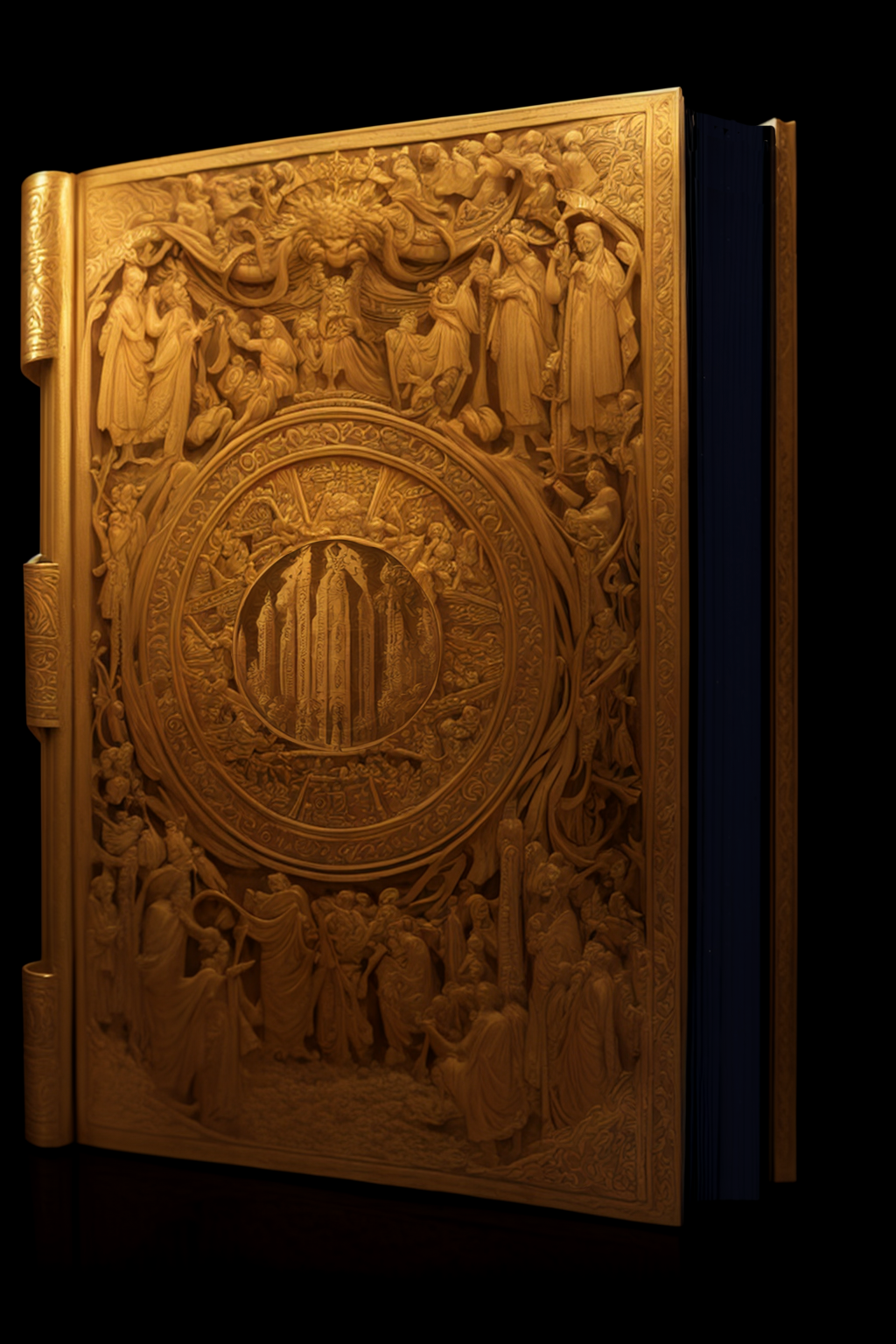Book of Names
Celestial Nomenclature Codex
Overview
Though there are many powerful and ancient artifacts in Empirica Sin, The Book of Names stands alone as the oldest of all... and the most absolute in its function. Fashioned by Nindinva and Solwae, the Book of Names was designed to be the ultimate - and final - judge of Astrum's naming laws. As the most sacred of Astrum's great artifacts, the book has been kept on the highest level of the Spiral Tower under the watchful eye of The Flower Shieldmaiden, Imladi for over 30,000 years.
General Information
The Book of Names is a massive book approximately 40 feet wide by 60 feet long, measuring 80 feet across when open. Its hard covers are engraved gold featuring an abstract representation of The High City of Astrum surrounded by representations of the first generation of Celestials. The spine is golden with decorative bands. The outward edges of the pages are black. Despite being metal, the covers of the book are always warm.
It isn't the book itself that vexes. It is what the book represents. Control. The hard edges of our society that seem non-existant for the Kasura or even the mortals. Why should they be free to dance when we are asked to march? Why should they be filled with questions when we are only permitted answers?
That is the trouble, you see. Because if we cannot decide something so simple as what we are called - what our children are called - then how can we expect to decide anything at all?
The book is impeccably bound, with pages of thick, creamy paper and golden leaf. Despite its metallic aspects, the pages move as would be expected from especially thick paper.
Looking through the book's contents reveals page after page covered in names, seemingly burned into the golden leaf. Each name includes the family to whom the name belongs, as well as a list of dates. These dates are the equivalent of a life span marker, stating the date that the name was claimed (or reclaimed) and the date that the name fell out of use (if ever). Occasionally, there are empty spaces where a name was stricken from the record.
The book appears about half-full. This is a permanent state, as each time a page is filled and turned, another page adds itself to the end of the book.
History
Over 30,000 years ago The Book of Names was created through cooperation between Nindinva, deity of law and justice, and Solwae, the deity of contracts, as part of the formalization of the recently instituted laws around naming. For more information on the circumstances that gave rise to the Book's creation, see Celestial Naming Laws.
Yeah, no, I've never seen the Book - never had to. I was a baby when my name was 'approved' and it's not like I have kids. As for how I feel about the laws ... well, on one hand I don't care and on the other hand, it makes yelling someone's name less confusing, so I guess you could say I don't mind it.
The book has not left the top floor of the Spiral Tower since... but that does not mean there have been no attempts to remove it. Though there have been many smaller attempts to steal or destroy the book, there are two especially famous incidents.
In 16,723, a human family that had recently been stripped of their names attempted to scale the Spiral Tower from the outside, break into the upper levels, and remove the book.
They considered it to be a tool of control imposed on the population by the Seven, and felt that destroying it - or at least removing it from Astrum - would help to promote greater freedoms among the Celestials.
This attempt resulted in the permanent banishment of that family. As they were banished while Unnamed, their identity remains unknown.
Approximately 5,000 years ago, in 25,034, the newly established rebel group, The Nameless staged an attack on the Spiral Tower while the Seven were gathered in Nindinva's domain. The attack was ultimately pushed back by the book's guardian, Imladi, and the gathered forces of the Radiant Dawn.
Despite these (and other) attempts, the Book remains in its place of honor. So it is, and so it will be.
Abilities and Uses
The Book of Names is a tool of enforcement for the Naming Laws; it is used to grant, deny, remove and replace names as needed and has absolute authority over the use of names among Celestials.
When a new name is created, it is entered into the text of the book automatically, and associated with the bloodline of the newly named person. The date of its claiming is burned into its page alongside the name; this date will update and be added to as bearers of the name pass away or relinquish the name and new bearers are chosen.
If someone requests a name that is already in use, The Book will flip to the page where the original use is recorded, revealing the name's current status and which bloodline possesses it.
BALMATES: With full knowledge of my actions, I - Balmates, Lord of the Mirhr, grant to the Oranil family the use of our ancestral name, Intevar, which was first claimed by the Mirhr in the year 12,082. In so doing, I understand that this name shall be stripped of us and gifted to the Oranil clan.
KYANA: It is the intention of the Oranil to accept, as affirmed by myself, Kyana, Lady of the Oranil line.
BALMATES: Yes. I witness this entry, and I confirm my intent.
This is the wordless rejection of a claim, and the petitioner (or their representative) is expected to choose a new name.
If they insist on reusing the name, the Book will strip them and their entire bloodline (living) of their names - a state they must hold for one year or more before being permitted to petition for new names. Such people are considered Unnamed.
In accordance with the Naming Laws, the Book of Names is also the means by which names are gifted from one person or family line to another.
The giver and the recipient must stand before the book and state the intention. Once this is done, the book will open to the page with the name in question and the giver must reaffirm their choice to relinquish the name. Once done, the name will close off its time with the Giver's bloodline, and the entry will be changed to reflect the new family's claim, starting on the date of transfer.
Because names are owned by not one person but the whole of a family, a single giver can make this choice alone only if they are the sole remaining member of the bloodline, or the head of the family.
If there is no head of the family and there are two remaining members, both must be present for the gifting. If there are three or more remaining members, then three must be present.
ContentsAside from the obvious list of names and dates, a single page at the front contains a numbered list of the Celestial Naming Laws. The book's writing throughout, including the names and rules alike, appear to be handwritten, though no physical hand has actually written them. Regardless, the writing is clear, neat and does not match the handwriting of any specific person or being.




Congratulations on your participation in the Magic March challenge, and thank you so much for your entry! Here's your shiny badge!